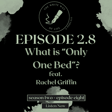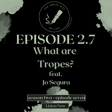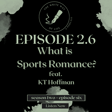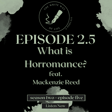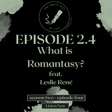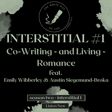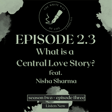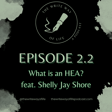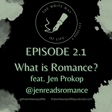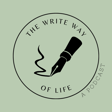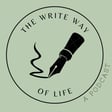Become a Creator today!Start creating today - Share your story with the world!
Start for free
00:00:00
00:00:01

"What is Plot?" featuring Hannah Kaner - Episode 5 - Season One - The Write Way of Life
This week's episode features Hannah Kaner, the #1 bestselling author of the Fallen Gods series, beginning with Godkiller. Hannah joined Karis and Adi to chat about all things plot, including ways to plot out standalones vs series and the minutiae of plotting out a trilogy where each book needs its own arc to complement the series arc. Stick around for the end of the episode, where Karis and Adi will fangirl about what they learned!
Find Hannah Kaner online.
Check out Hannah’s books.
Transcript
Introduction & Jerez's Health
00:00:15
Speaker
Hello, hello, Addie. How are you? Oh, you know, getting by, as they say. As they say, indeed. To all of our listeners and to Addie, I apologize if my voice sounds funky. I have a cold.
00:00:33
Speaker
ah Annoying AF. But here we are. We're pushing through it. We're bringing you the intro to this week's episode of the Right Way of Life podcast.
00:00:45
Speaker
We will try and keep it short and sweet so that Jerez can go back to napping. Back to sleep.
Addie's Recession Experience
00:00:51
Speaker
um Well, first off, it is Saturday, April 5th of 2025.
00:00:58
Speaker
um What has this week brought for you, Addy?
00:01:05
Speaker
Uh, I read some, I read a book. I read a, so that was fun. it got to experience my first real recession while in the workforce. So that's also fun. You're doing great.
00:01:20
Speaker
Yeah, it's, it is, um, you know, I'm going to say it's an honor to live through historical events because otherwise I'll cry. Okay.
00:01:31
Speaker
I thought she meant like, otherwise, is it if I'm not living through historical events, I'll cry. And I was like, all right, Addie, whatever. No, I would like, I would love if I, well, actually, you know what? i'm I'm too much of a masochist. I think I would be bored.
00:01:48
Speaker
That's so funny because I remember growing up, like in my youth, I was like, i wonder where i met I would love to. i was like reading fantasy books and I was like, I want to live through interesting times. You know what?
00:01:58
Speaker
Young Karis, fuck that bitch. like She didn't know shit. um Anyway, this week has been it's
Dealing with Creative Burnout
00:02:06
Speaker
been weird for me. I realized at the start of the week that I'm a bit creatively burnt out.
00:02:12
Speaker
So I'm taking a forced break from writing, which has resulted in a lot of coloring um while listening to audiobooks, which has actually been really restorative, but also sad because I want to write books.
00:02:27
Speaker
You got to take a break, though. It has to be a meaningful break, as they say. Yeah, so I'm taking whole, like, no writing at all this week, Monday to Sunday.
00:02:40
Speaker
Next week, I'm allowed to write some articles that are due for the but the cash money. um and then But I'm not allowed to write my books or think about my books.
00:02:52
Speaker
I'm just allowed to color while listening to other people's books. It sounds very restorative, like you said. Yeah, it's just, um, I've got that, you know, that urgency, right? That, um, Alexander Hamilton, why do you write like you're running out of time? Like, I've got that, like, I gotta get it get it done. Like, get my stories out there because life is passing me by. And I think that's a bit of a fallacy.
00:03:21
Speaker
um especially and Especially now with like the tariffs and shit.
Art Investment During Great Depression
00:03:26
Speaker
like Who knows what what is going to be in publishing's back pocket for the next couple years but i mean mom years.
00:03:35
Speaker
This is not a hope because I think that if this were to occur, things would be very bad. but like From a historical perspective, um when we went through the Great Depression and then elected FDR, things were better.
00:03:49
Speaker
Well, there was significant investment in the arts in a way that like this country hasn't seen. um I'm trying to think of what the exact program was called. But basically what they did is they hired a bunch of unemployed artists um and really rejuvenated the arts and like...
00:04:06
Speaker
federally funded the arts in a way that hasn't existed ever since that program. I think it lasted for like 10 or 15 years. um But like the American Theater Project came out of it. I did a whole study in in college about it which is the only reason I know about it, um which is very like fascinating to me as a as a means of like helping the people after a really significant economic hardship. They turn to the arts and creativity to give people hope.
00:04:34
Speaker
Yeah. um so i do think it's i'm gonna be clinging to the arts both my arts and others arts over the next few however long this nightmare lasts lost my turn of thought i'm gonna blame the sick brain for it um oh fun fact the audiobook that i'm listening to right now god killer Yes!
Interview with Hannah Kaner
00:05:02
Speaker
Hell yeah. segues so nicely into our introduction for the episode. Because this week's episode, who did we talk to, Maddie? We talked to Hannah Keener, who is the author of that trilogy of books that now is published and is complete.
00:05:19
Speaker
I am a huge Fallen Gods series. The Fallen Gods series, yes. I started reading Godkiller before we interviewed Hannah, and then the library was like, whoopsie doopsie, you didn't finish it in time, and yanked it back for me. So now I'm racing through the end of it, loving everything about it.
00:05:38
Speaker
um But yeah, we talked to Hannah Caner this week. We talked about plot. It was a really, ah really great discussion. um i had a lot of fun with it. think she's brilliant, so...
00:05:51
Speaker
Incredibly so. Yeah. i i really, and for me, especially like I'm a huge fan of the series. so it was very cool to to hear her talk about plot and also talk about plotting like a multi book series too. Yeah.
00:06:06
Speaker
Absolutely. Addy, would you like to read Hannah's bio and then we'll just.
00:06:14
Speaker
We'll just go right into it. Yeah. Yeah. Thank you. No problem. All right. ah Hannah Kaner is the three-time number one bestselling author of God Killer, Sunbringer, and Faith Breaker.
00:06:26
Speaker
She has been shortlisted for the Hugos, Locus, British Book Awards, and British Fantasy Awards, as well as longlisted for the Glass Bell Award. Her work has been translated into 15 languages and counting.
00:06:37
Speaker
And with that, we're going to go into the episode. All right. We are here um back at it again with The Right Way of Life. Oh, my God. I almost just mispronounced our podcast name. The Right Way of Life podcast.
00:06:51
Speaker
And we're here today with Hannah Kaner, who is the incredibly talented and bestselling author of the Fallen Gods trilogy is the name that I just panicked that I had wrong, but it's the God killer books that you've seen everywhere.
00:07:07
Speaker
um And so we're here to talk about plot and I'm super excited because as I have said like five times already today, I plot is my weakness and I'm so excited to learn and to chat about it and to see what we can talk about.
00:07:22
Speaker
So yeah. So Hannah, do you have anything you'd like to share to start about yourself or your books or anything like that? oh, I probably should have a spiel, like, so pegged by now. um But, I mean, thank you so much for having me on The Right Way of Life. um i Yes, I'm author of Godkiller, which is the first of a trilogy. You got quite right, the Fallen in Gods trilogy.
00:07:44
Speaker
ah The final book, Faithbreaker, is out in North America on the 1st of April, out in the yeah UK on the 13th of March. And that kind of brings that that story and that trilogy to a to conclusion. So it's, yeah, it's been a journey both of um what what feels like massive extraordinary look and and discovery and um yeah just really really excited to be able to talk to you about it Yeah, and okay, I did not realize it was coming out so soon in the UK already. it is, as we're recording this, it's March 12th. Tomorrow. recording it. Tomorrow.
00:08:20
Speaker
Oh my god, that's... Well, thank you for being here with us today. I know, of course. My first launch event is in Edinburgh, where I'm based um at the moment, so... um yeah it's nice to be I'm i'm in hope in my own home and that's that's really lovely I'm looking forward to it's with an author that I really admire and have known for a long time called LR Lamb who wrote um most recently Dragonfall and Emclaw and being chaired by a really old friend of mine who also has a book coming out next year or year after called Salt
00:08:55
Speaker
ah oh salt Salt Swept. Oh, God. That's immediately when you there. They're called Catalina Watt. Okay. Amazing. That's so exciting. um Yeah, so obviously you have you have this trilogy. It's a fantasy trilogy, um which...
00:09:16
Speaker
has plot, you know, obviously that there's a story. that's it's It's every single plot has its own. yeah but Who knows? Every book has its overarching plot and then the series has its overarching plot. So I'm really exciting excited today to dive into both how you plot individual books and how you plot series.
00:09:36
Speaker
But my first question is just back to the
Understanding Plot - A Discussion
00:09:39
Speaker
basics. How would you define plot if you were talking to like presumably like a five-year-old child who has never heard of the concept of plot in a book before?
00:09:49
Speaker
ah i suppose plot at its most basic is how does it begin and how does it end and what the connections are between those two spaces. um So it is kind of...
00:10:03
Speaker
On a more like kind of complex note, it often has kind of acts or structure that um you can adhere to. There's a lot of theories or ideas around what plot might be. um But I've never had anyone come up with... I've never had any strong convincing that there is one single way to plot a book as soon as I decide that there is and there must be and that there is a trick someone comes and proves me completely wrong over what a book looks like or what it has to feel like um so yeah it is basic it's the structure of the book the beginning and the end and how to get from A to B yeah that was such a beautiful distillation of it um so I really great sound clip
00:10:48
Speaker
Um, so, ah for those who are listening, who may not be aware, I'm going to use the terms plotter and pantser, which in the bookish, the writing sphere tend be two sort well known, oft used terms for how you go about tackling
Plotting vs Pantsing in Writing
00:11:07
Speaker
the plot of a book. Now, if you're a plotter, the sort of wisdom goes that you, you always know what you're doing. You have an outline, you know exactly how it begins, you know how it ends and you know the steps in the middle.
00:11:19
Speaker
Pancers by the seat of their pants, kind of, you just, you know the beginning, you might know the ending, you might know some scenes in the middle, you may do some, like, um you know, flashlight method or, like, breadcrumbs where you know a few scenes ahead, but you don't really know every step of the way. So my question to you is, one, do you believe in plotting and pantsing and the difference between the two?
00:11:45
Speaker
And where do you fall on that sort of, not so much a more like a pendulum right like there's shades in the middle where you're you know like 70 pants and 30 plot you know that kind of stuff but that is a great way of looking at it um yeah i'd say i do think those um approaches can be really useful to think about the way that you write so to be kind like this is a technique or an approach that actually works well for me and you think i'm a plotter then you can help like look for different techniques around plotting. If you think kind of like, actually feel better around pants, like pantsing it, you can kind of look at, as you're talking about the flashlight method, the breadcrumbs method, like what's going help you get through, through the act of writing a manuscript because it's quite hard.
00:12:28
Speaker
It's, it's a huge undertaking that and we often, know, most at the beginning of our careers, we'd undertake this massive piece of work with no guarantee of any return. And we just have to kind of ride on the passion of it. And, and for many people that,
00:12:44
Speaker
passion needs to carry you throughout um the rest of your your career. um So I would say I definitely lean towards pantsing, um you know, on the on the spectrum or the pendulum, but it has varied from book to book and it has depended on what I'm trying to get out of the book. I would kind of say...
00:13:05
Speaker
The way describe myself without those ah those terms would be I'm an iterative writer. So the first draft is the most terrible draft, um but it's the way it's like the bones of the book. It's kind of like getting getting a feel for the story and kind of telling myself the story.
00:13:23
Speaker
um Often I do have a kind of vague idea I want it to begin. and an idea of how I want it to end. um With Godkiller, it also helped to have the conceptual underpinning of it is a quest book. It is a kind of traditional fantasy there and back again, I guess, without the back again.
00:13:40
Speaker
um But that helped me think about what the structure of that might be and how I wanted to play with that. So really looking into... kind of hero's journey concepts and then walking back from, okay, what do I like about this? What do I hate about this? And how do I want to kind of draw out the things that love the most and acknowledge the things that are widely recognized and then also twist them a bit as well. And I do think kind of looking at techniques around plotting are really helpful, even if you don't work in that way, but just to kind of see...
00:14:19
Speaker
what you're trying to play with, what kind of, what other people recognize and whether you're trying to draw away from or lean into that, and which I think is very helpful when you're looking at the process of, of writing.
00:14:31
Speaker
um With book two, I And book three, I plotted in more detail, partly because there are a lot of threads that i laid out that actually, I had to tie up, apparently.
00:14:41
Speaker
um that' That old chestnut of, oh you've set
Evolving Writing Process & Character Importance
00:14:45
Speaker
up all these fiiest problems that somehow you have to resolve. um And that was more helpful. That was helpful for me um for those books because they also had, and yeah, I wasn't starting from scratch. I had to begin ah where I left off in book one. So,
00:15:02
Speaker
I definitely plotted a bit more, but I still had that same approach of I need to tell myself the story first to convince myself to love this story before I can iterate and edit and um improve and evolve this tale, which for me is like where kind of think about it as weaving, like the overall plot is the warp and the story and iterations through it is the weft. It's adding color and it's adding depth and it's adding...
00:15:30
Speaker
um beauty in space as well um so yeah that would be my approach fish that is that's really interesting i love that you you called it iterative that where it's like you're you're learning the story as you go and i do hear that often from authors you know the ones who are more on the panzer alignment um that like you have to sort of knowing every beat of the story he somewhat maybe makes it harder to then write the story.
00:16:02
Speaker
um i When I first started writing, I pantsed, but that was because I didn't understand the books needed, again, needed to have a plot. um And I just was like, I didn't know what I was doing. So I just sat down and then the characters started doing things. And I was like, you know, they were three steps ahead of me and I was just racing to catch up to them. And it made for some really wonderful stories.
00:16:24
Speaker
So when I was little more serious about it, I did teach myself to outline outline and to come up with like, you know, what is the plot apart from what is the premise of the book? What is actually going to happen in the book?
00:16:37
Speaker
And I have found that without knowing where things are going, like I just can't do it. I just get bogged down. um So it's so interesting how the different...
00:16:49
Speaker
And like you said, there is no process, like there is no one true process for writing, even, you know, I'm sure like your process changed within the books in the same series, like, every writer has a different process from each other. There's, as V.E. Schwab's podcast says, there is no right way.
00:17:10
Speaker
Um, but I do. I love that. And I find that so fascinating, because I have always been a little bit intimidated by fantasy and by series, because of the need to sort of weave things together in the end.
00:17:23
Speaker
um So I'm just like in awe that you pants.
Fantasy Elements in Plot Structuring
00:17:27
Speaker
mostly hence like Godfiller and then it just turned out and obviously revision has a lot to play in how it turned out but still I'm really impressed I kind of um definitely of when I was playing around with the concept of the world like I wanted to kind of push some of those concepts particularly those of of God and faith God and gods and faith and power to their conceptual end so I knew that there was going to be um
00:17:54
Speaker
well I knew there was going to have to be a war, find a kind of cataclysm between you know different kinds of of faith. I knew would have to be a rebellion because all good fantasy stories have a bit of rebellion in them. That's not true. there are There are all sorts of different fantasy books but I really kind of wanted to lean into these things I love about fantasy. So the first book begins with a quest, the second book has a rebellion and the third book has as a war.
00:18:20
Speaker
So was definitely sort of drawing out the things that um I loved about epic fantasy um and yeah it kind of leads you into thinking okay what do what might this look like what the kind of conceptual limits of that and that helps you shape the overall narrative narrative but it also has to lean into what the characters would do as well because I think sometimes I would overimpose myself as an author being like this character has to be here doing that.
00:18:50
Speaker
And that's the kind of the end point they need to go to. But if it doesn't feel right for that character and where they are emotionally or where they are um mentally or who they are kind of to their core,
00:19:03
Speaker
then the plot feels forced upon the character rather than feels an and organic growth from where they need to be. I think kind of that really does vary between authors and with books as well.
Structuring Books in a Series
00:19:16
Speaker
And I definitely think with a more complex plot, like my next book, it's been much more valuable to kind of have a sort of a series of very conceptual acts involved.
00:19:27
Speaker
Whereas with Godcaller, I kind of retroactively applied the acts. But they come came quite like naturally out of of a quest narrative. With Sunbringer and Faithbreaker, had to kind really think about how those books were going to be structured in order to reach their conclusion, to feel like they've moved a little bit further without moving too far.
00:19:46
Speaker
um So yeah, I had to kind of apply more conceptual limits to myself. Whereas already kind of knowing the overall arc of the story. Yeah, I do love that you called out that character affects plot and that, I mean, as it should.
00:20:00
Speaker
i The first book that I ever fully outlined is also the book that I signed with my agent with and went on sub with. And I originally had a climactic scene with character A...
00:20:11
Speaker
getting up on a chair and like taking responsibility for some rule breaking that had happened. And I reread the book and I went, no, it's gotta be the other one. Like the love interest character be like, this is more her thing.
00:20:24
Speaker
um And so I just like had to rewrite and so flip it. And I was like, no, this, this works. Like this actually makes sense. And cause when I'm outlining, it's like, I don't actually you know the book that well. Like I don't know the characters. I meet them as I'm writing them.
00:20:40
Speaker
So by the end of the first draft, I'm like, okay, now we can fix this and like make it real. I think that and like comes into something else that I brought into Godkiller that I really enjoyed was whose perspective is best placed to tell this part of the story?
00:20:55
Speaker
and For quite a short book, i for Godkiller, kind have four different points of view. And it wasn't my original plan, but as I was writing the story, I was like, this is going to be...
00:21:08
Speaker
too black and white if it was all told through the god killer's point of view because she has that way of thinking uh which is great and really fun uh to write but it wasn't kind of enough to sort of see the the nuance and change within the world itself so each different chapter had to think sometimes when i finished applying it i was like it has to go in a a pattern so it'd be kind of the god killer then the little girl then the knight errant then the god and it would kind of repeat in that way because I wanted to kind of make sure that the reader felt
Choosing the Right Character Perspective
00:21:40
Speaker
placed and that they knew whose voice was coming next but as I was writing it didn't feel right like kind of that it felt like the wrong perspective was telling this part of the story and even if they're in the same place that different angle on it made more sense um so I love the way yeah you've talked about
00:21:58
Speaker
This movement needs to happen, but from which place is there going to be the best place for it to feel end Yeah, I was reading Sabah Tahir's An Ember in the Ashes series in my grad program, and we had to write essays on craft topics. And i my my favorite title ever came up with was on the press point of view and like who's speaking and who's seeing things. And it was like, whose eyes see what? And I was like, wow, you're you brilliant, Karis.
00:22:27
Speaker
But it's exactly what you just said, where it's like, sometimes you're writing and you realize, no, wait, this like what's happening is the right thing to happen, but I'm looking at it through the wrong person's perspective.
00:22:37
Speaker
um so And that's like one of the really exciting things about writing is um another mantra that we had in my grad program was writing is revising, right? Like the story happens, like the magic often does happen in revision. Yes.
00:22:50
Speaker
yes Yeah. I much prefer editing to to drafting ah personally. I think it it can vary. um Sometimes I just, when you're when I'm drafting, I'm like, I'm making myself so many problems i'm going have to deal with later.
00:23:07
Speaker
And so I just like, I just know there's a future in which whatever I'm writing is going to be an issue for me. Whereas when I'm editing, i i like being the fixer of problems. I like being able to see where things misalign. And that's one of the joys of working with an editor or a beta reader. If you don't have an editor, it's like sometimes they can see what you haven't been able to when you've done that first pass through of, yeah, that happens then that happens and that happens and that happens.
00:23:32
Speaker
And then they come in with the why. um so yeah i much prefer i much prefer editing i much prefer revising i feel like that's where i can sort of grasp what's there most clearly um whereas plotting for the plotting writing drafting for the first time is just i've got to get something down that i can then play with it's like thunking the clay onto the killer Yeah, it's the revising is where you can bring out the like, the small brush and do the details and like, I'm mixing metaphors here.
00:24:04
Speaker
And then you can have the needle and you can do the small threads and like make pretty designs and then drafting is like, you're just throwing everything out. Yeah. ah got to get I've got an overall shape. There's a shape there and it's a mess and it's all tangled but it's like at least it's kind of vaguely the right colour.
00:24:20
Speaker
um I don't know. Yeah. We're getting somewhere with it. mom So I would also know because this fascinates me um as someone who has I've never written I've written nine novels and they're all pretty much standalone. So I've never had to think about plotting through a series.
00:24:40
Speaker
So I would love to know how do you handle, like, what is the difference between plotting when it comes to one book, a standalone or one book in a series and like the series arc as a whole?
00:24:51
Speaker
How do you kind of tackle that task? It's really difficult. um
Challenges in Plotting a Book Series
00:25:00
Speaker
I mean, it it sounds to me that there are incredible writers who write books over 10 or 13 books. And i mean, it's also incredible that you have that space to explore all these little nuances that when you only have a trilogy, you've got to kind of, you've got to let some stuff go and not...
00:25:17
Speaker
you know leave some doors unopened. um When I first pitched Godkiller to my agent, I pitched it as a two book, um as a duology, partly because yeah know i'd I'd gone through the submissions process so many times that I was like, would someone just please pay me so I have an excuse to like keep doing this? Because it's getting to the point where it's just kind of embarrassing.
00:25:41
Speaker
ah ah Who am I kidding? That was like three books before that. But it was it was that sense of I will literally do anything and accept any money as long as someone takes this book. But um it was my agent who came back and said ah trilogy from the potential of the world and also the sort of, I guess, the traditionality of it, a trilogy kind of makes more sense. So she did ask me to write synopses within like 12 hours for the next two books. And I was like, I don't know.
00:26:15
Speaker
But I think, yeah, giving, holding concept of a three-act structure in my head of kind of Act One is, you know, it's like a new hope. It's like you're setting the new, the groundwork. Act Two kind of has to be the Empire Strikes Back. And Act Three has to feel like you've,
00:26:34
Speaker
reached some satisfaction um even if you leave some some threads dangling it's going to feel like you know and Return of the Jedi it's going to feel like okay we now have can move on in the story and this chapter on it is closed it's one of the things i love really so much for Robin Hobb it's actually threads trilogies together um and that is such you you can finish that first trilogy and then feel this is satisfying enough.
00:27:01
Speaker
Oh God, i really want to read some more of these characters though. And then she writes another trilogy that kind of links and widens the world. And I think that's a really beautiful thing. um So yeah, I kind of, when I first was doing the synopsis of the whole trilogy, I had a three-act structure in mind of it has to go...
00:27:18
Speaker
and you know follow that kind of ah approach that has I guess been quite embedded into us from from film and tv and and books is this is what a plot feels like however I also had to be willing to relinquish that over the course of the books based on as we were discussing earlier what makes more sense for the character and what is actually going to challenge that in and myself. So it's kind of both putting the cart before the horse and then putting the cop horse in front of the cart and then you know letting the horse rest for a bit and sort running away with the cart and you're on.
00:27:53
Speaker
It's, you know, let's just really throw metaphors until it's dead. But it's... Yeah, it was about trying to see what is the conceptual end I can take the story to that feels satisfyingly epic.
00:28:09
Speaker
um So with a classic, you know, got a classic final battle the end of Faithbreaker. I won't do any more spoilers than that, but... But then also kind of being willing to relinquish certain parts of how I wanted to get there. So in book two, I did the dreaded thing of um I spit the party.
00:28:27
Speaker
I sort of had my characters be in different places. And it felt deeply wrong, but I also felt like I can't, really see who these characters are unless I break them up um and then with book three I actually kind of had split it in my head into four conceptual acts and then I removed one of them completely
Integrating Child & Adult Perspectives
00:28:50
Speaker
because it was either i write that and it's a 200,000 word book or I get rid of it and shorten it and then it is kind of not so bloated beyond the recognition of readers who came in with God colour at 100,000 and
00:29:07
Speaker
So yeah, it requires some sort of pushing, mentally pushing yourself into certain boxes and then smashing the boxes saying they don't fit anymore.
00:29:20
Speaker
So kind of like compromises with yourself almost like yeah you you have a vision and then you change the vision because it's not going to work here there. and Yes.
00:29:31
Speaker
Another way. It helps to kind of have an, especially when you're pitching, and I imagine lot people who are writing, um who are listening to this might be kind of in their first book and are hoping for it for writing deals and writing trilogies or writing series.
00:29:47
Speaker
It helps to have an overall idea that you can lead with. um with an an editor or an agent or a publisher of where you think it's going but you also don't have to commit to that if that changes as long as your editor and agent are on board with it as you go through the story saying actually this doesn't quite fit right, this needs to move.
00:30:10
Speaker
And most of the time, they're really willing to go with you on that journey because they see you as the expert in your in your characters and in your plot. They may have suggestions of their own, ah which are usually really, really good.
00:30:23
Speaker
But yeah, it's it's nice to be feel like you're kind of collaborating on it with your past and future selves and also with other people. I have a bit of a minutia question sort of um in regards to like your series specifically with overarching plot is you've got one of your main point of view characters as a child.
00:30:41
Speaker
So what was it like um plotting out having ah like a young individual, like a I think what 12 or 13 year old and also interweaving adult characters too and and making sure that the plot worked for for both age ranges? Was that a challenge or did it just come naturally or what was that thought process?
00:31:01
Speaker
Oh no, it but definitely a challenge. like I knew I wanted to play with the trope of the kind of world-weary warrior and their sort of adopted um feral child. When I introduced Dinara's point of view, she kind of became, to an extent, a bit of a proxy for the reader because having that world-weary point of view is is great.
00:31:24
Speaker
But Kisin and Ilo in particular see the world through a very limited lens of I already know what what everything in this world has to offer. um Whereas Inari is kind of looking at it new.
00:31:38
Speaker
And that allowed me to kind of... i didn't add a bit more hope and a bit more kind of um naivety but also genuine excitement into the world as well and or i think or is so important for um being able to like kind of see and feel that especially in a fantasy book um so yeah inara was also interesting to try and get behind the voice of of a child and have her feel both equal to but also looked after by the adults in the story um and it was quite difficult as well because she has to mature very very quickly throughout books and she's put into situations that no child should ever be put in and her reaction to those situations is sometimes has to be that of a child and is a bit petulant and is a little bit annoying and is a little bit no at all because as a kid that's kind of what you feel I mean having been that no at all kid um that sense of who she is
00:32:37
Speaker
felt really important that she has to get things wrong. um And it's really difficult to write a character you have so much sympathy for and and write them kind of messing up and making mistakes, and especially as as a kid.
00:32:55
Speaker
um well It's the same for every character. But because she kind of comes with the adults on this journey, they end up having this kind of shared experience that allows them to be honest with each other.
00:33:11
Speaker
So yeah, she does kind of have conversations and maybe see the world in a way both more foolish and more wise than normal sort of 13, 14 year old kid.
00:33:24
Speaker
um But it was really important to the novel to have that kind of the grace that childhood can can give a story. Absolutely. Thank you so much. Yeah, that was when I was when i was reading those books, which I'm ah absolutely so excited for the third book to come out.
00:33:40
Speaker
That was something that I really, i felt was so well done, especially just from a perspective of like getting all of these characters and them going on this similar journey. um And so I just, yeah, I just wanted to ask you about that process.
00:33:53
Speaker
But I'll give it back to Karis to ask our next question.
00:33:59
Speaker
um Speaking of, so...
00:34:04
Speaker
If for the anyone who's like in the world of writing, we're familiar with, you
Writing Rules & Conventions
00:34:10
Speaker
know, you you hop on threads, you hop on blue sky, you hop on Instagram and you're going to be bombarded with writing rules with someone being like, for like write every day. No, write every other day. No, you know, you have to plot out in the three act structure, the four act structure with post-it notes, with a whiteboard, with, you know, chalk on the ground. Like and there's a rule for everything.
00:34:32
Speaker
Yeah. And my question is, what are some rules or conventions for plotting that you actually like really love and that you're like, I, that you think are really valid and maybe not perfect a hundred percent of the time, like maybe not a blanket general statement, but just like actually really worthwhile.
00:34:52
Speaker
Uh, okay. I'll go for couple ah One of which is not really from writing techniques, but more from software engineering. But I'll start with that one, which is what's called the rubber duck method, um which is if you're stuck move away from the thing that you're looking at and try and explain it out loud even to yourself ideally to a like a ah friend um or even just kind of typing it out on screen is kind like and so in software and engineering it's kind of it's a specific method when you're debugging or you're trying to kind of figure out a a technical problem is can i explain this in layman's terms and can i kind of articulate this clearly and that's really really helpful for me
00:35:39
Speaker
because it means that I've stopped staying in my head and I try and actually say the thing out loud and that helps detangle it because otherwise I just ended up bashing my head against the keyboard and hoping that words come out.
00:35:52
Speaker
um One, i do think thinking about...
00:35:59
Speaker
stories in terms of beats and acts can be helpful as an approach um i sort of read i think it's john york's into the woods which is talking about um mainly kind of the the beats and acts of of film and script writing and trying to articulate those in a way that makes you feel like every scene has movement, every scene has purpose.
00:36:23
Speaker
And that's thing that was very, very helpful for me when at least drafting for the first time is and then editing Godkiller was what purpose does this scene have? Its purpose doesn't have to be to shift the plot forward. It doesn't have to be all action. And i I personally prefer narratives that are a bit more... ah you know give them give have a bit of flexi space around them and and really rest in the world a little bit i mean i love rip-roaring patron as well but saying that really makes i love plots that pause um and and
00:36:57
Speaker
But that kind of, even if the movement in a scene isn't to move the characters or to have something dramatic happen, it can be an emotional movement. It can be an experiential one.
00:37:09
Speaker
And I think that's always really helpful. And that's helped me when I'm writing, especially the first time, like a lot of important conversations just happen between a couple of people in rooms. so And it's essentially kind of like a black stage where there's no lights on, there's no background sceneries, just kind of conversations.
00:37:27
Speaker
And often they happen in places like private places, because that's where you can imagine a conversation, important things happening. But when I transplant those characters into, okay, what is, if they have this conversation
00:37:40
Speaker
in a city square, what if they have it while someone's arguing really loudly next to them? What if they're, um You know, what activity is happening around them that makes it feel like the world has depth and space.
00:37:53
Speaker
And also, how does that impact how they're talking to each other? So what do they smell? How do they talk? What are they listening to? What are they afraid of? And that gives each scene that kind of movement.
00:38:07
Speaker
of
00:38:10
Speaker
even if it's like maybe not hitting a plot beat it's hitting an emotional one I think that's something that's very helpful especially when deciding what to keep and what to kill and and Yeah, I suppose those those are my like my two main ones is look into
00:38:31
Speaker
into the woods and the three-act structure and the um ideas around what plot have been and scenes and beats and chapters. And that is really helpful for me to kind of remind myself what people are expecting, but then also give yourself permission to not see that as a rule of law, see it as a springboard.
00:38:53
Speaker
Yes, I love that. um Real quick, are there any maybe non-book media like stories that you always recommend for people to learn about?
Influence of Films on Storytelling
00:39:06
Speaker
Like plot like you mentioned earlier the Star Wars, the um episodes four, five, and six, like that for the the overarching theme. like Are there any other like TV shows, movies,
00:39:17
Speaker
and play, musicals? Sorry, I ran out of other media for a second. hello Anything else?
00:39:27
Speaker
Oh, I'm really going have to think about this. i' Sorry. I mean, i i I would say I exist, like, primarily in books.
00:39:42
Speaker
I mean, i I can think about things I've i've watched or read recently, i mean Lord the Rings as a book and a movie really leans into what we like still consider the conceptual centre of what's like fantasy storytelling Western fantasy storytelling can or should be ah which is always fun when people come and sort break that mould but I think it's also a mould that we are used to seeing um and
00:40:16
Speaker
trying to think of
00:40:19
Speaker
Other things that kind of really kick you out of... Well, I've really lost to Ghibli films. And we were talking about that kind of resting space and plot. And that's something that Izaki is... Particularly with Hayami Izaki's films, that he specifically talks about um sort of that concept of ma or like space around...
00:40:41
Speaker
a story and you can feel and see it in his as films are so atmospheric is like kind of he has driving plots and forces of nature and sort of one person's struggle against an unkind world but then you also kind of have those moments i was talking about earlier of awe and of scenery and of magic and rest where nothing is necessarily moving it's looking um so i would recommend those yeah watching and experiencing media also outside of western canon um which kind of has to challenge
00:41:24
Speaker
you know those structures of of plotting that we're so used to um and looking kind of at media from from different areas and really Yeah, changing how we think about what our work should look like ah and what we expect from each other. Yeah.
00:41:45
Speaker
Yeah. There's something really beautiful about taking what is expected, what people expect to see and sort of subverting that in some way. um And also in broadening our horizons.
00:42:00
Speaker
when it comes to what we think of as acceptable storytelling, like format. but yeah The next question that we have for you is sort of, we've sort of been touching on some aspects of it, but this is more specific
Tips for Plotting & Drafting
00:42:17
Speaker
like process. What are your best tips and tricks for plotting? Like what have you discovered throughout all of your writing journeys as you've been plotting these, these books?
00:42:27
Speaker
Yeah.
00:42:32
Speaker
one thing that especially when it comes to drafting for the first time and you really mean this has happened to me so many times you're kind of 30 to 50,000 words in and then you know you've set up a bunch of stuff and you're like oh how do I get over this this hump um I think for different writers it's a different point but for me it's usually around 50,000 words where I sort of lose the will because I know there's so much more to go and that I you know really backed myself with some of the stuff I put in there and I'm like well you know I'm actually a really terrible writer and I should just never even try
00:43:07
Speaker
um for me, what gets me through that is, um has again, depended on the book is either write the scenes that have been sitting in your head for like a really long time. And this is something that I do is I really kind of mentally have these scenes that I feel and my heart are like really pivotal to the book.
00:43:29
Speaker
um And so kind of, essentially entice yourself scene first some people think this is a terrible idea and think you should hold those like a carrot um but for me I just want to eat the carrot and I want to remind myself why am why I love this um otherwise it just becomes too daunting i want to so I essentially write the scenes I love the most and then I thread those together with plot and even if it's terribly thin at least they're there um And the other one is to return to the characters and what i where I want them to finish. um This is particularly difficult for the second book in the trilogy because you have to have, yeah you have to take them so far, but their story can't be complete. They can't have
00:44:15
Speaker
come to the point where, you know, they're completely emotionally healthy and everything's fine and they're just going to get on super well for the next story because otherwise there's nowhere no for those characters to go or to grow. um So trying to figure out where they begin at the beginning of the book. So what are the lies they're telling themselves?
00:44:33
Speaker
What are the um changes that they need to go through? What are the kind of what is what they want and what is the opposite of what they want and how do we sort bring out that conflict. and So really plotting out that character arc of where they are, what lies they going to have to confront, what aspects of themselves are they going to have to confront and where I want them to go.
00:44:56
Speaker
And that kind of helps me plotting letters out for each individual character. So particularly for the four main characters for Skadi, Ilo, Edara and Kisin is saying, where do they begin? where do I want them to get to by the end of this book? And that's really helpful for me because that helps shape what the challenges are going to have to be around them.
00:45:18
Speaker
um I think those are my two... sort of tools both for plotting but also for finishing a draft because yeah finishing a draft is it's a it's a huge task most people most of us are doing this around jobs or caring duties or around illnesses or around so many things saying what are you doing and why are you doing it and So being able to get to the end of a draft is an incredible achievement.
00:45:44
Speaker
um I think most of us don't acknowledge in ourselves a lot because there's always another step to ah So I think kind of, and that in itself is a process of learning and a process of developing as a writer, like to write as a thing and the whole of the thing.
00:46:00
Speaker
who Yeah, I love those. I especially love the idea of like, when you're halfway through the book, and and you just really want to eat the carrot, rediscovering that love of like the story and of writing to to like, give yourself the energy to finish the draft, like you said, because that's, that's what we got to do. We got to get the draft done. And then you can get involved in the editing process and really shape that story.
00:46:23
Speaker
So, yeah, thank you for that. It was something that, thank you, something I had to keep on returning to. I mean, Karis, you said you've written like a number of novels, like when there are so many reasons to not write another one because of the time investment versus the likelihood of rejection versus the exhaustion, the hope and the heartbreak.
00:46:51
Speaker
what kept me going was kind of keep on reminding myself, would I still be doing this if I never got published? Is this something that I would still want to do? And the answer ended up always being yes.
00:47:03
Speaker
A whole truth of that might have changed, but i I always wanted to kind of had to go back and sort of say, is there any point in picking up a pen again or keyboard as the case, maybe in my case.
00:47:16
Speaker
And the point was to, is the joy of it is the love of writing. and And that's what, yeah, we've got to give ourselves the carrots to to look forward to um ah rather than beating ourselves with sticks.
00:47:31
Speaker
Oh, man, you are speaking things that I needed to hear because I'm over here like, you're not allowed to eat the carrot until you've beat yourself three times with the stick. Like, i don't know.
00:47:42
Speaker
I need to hear that sometimes you are allowed to, like, just do it for the love of it and, like, find the joy in it. um I have definitely gotten bogged down in the publishing process lately. So, yeah.
00:47:55
Speaker
Very needed words to hear today. You can do it.
Balancing Writing Passion & Business
00:48:00
Speaker
yeah But give yourself a carrot sometimes, you know. but Yeah, a carrot or a cookie.
00:48:06
Speaker
I mean, you know, just something to keep me going. A lovely bit chocolate. There's a book by Anne Lamar called Beard by Beard that my friend Elle recommended to me, and which was about, yeah, essentially one piece at a time.
00:48:24
Speaker
Just keep moving. um And it's exhausting and it's grueling and it feels like there's no... end point and that's it that ever is an end point as soon as you um finish a book then you're kind of writing the next one if you're under contract then there's a potential for that contract to end and there's we've got at least encourage like you know at least find the love of it otherwise we're just gonna wear ourselves into the ground and sort see it as a marathon and not a sprint Yeah. And don't move the goalposts. That's what I spent 10 years in the querying trenches and was like, you don't need to move the goalposts. And then I got an agent and I was like, the goalpost is 10 yards down the way. Like it moved. i I moved it the second I got that email. I was like, all right, let's go.
00:49:11
Speaker
Yeah, absolutely. It's like, okay, I've done the thing that I've waited for years for. I'm not going to celebrate because now there is the next thing that I must now do. It's, yeah, it's it's really hard because it is an art.
00:49:23
Speaker
Yeah, it is an art, but it is also business. And it's so hard to reconcile those two aspects of of writing and and and creating and in general. It's like, how do I both protect myself, but also protect myself?
00:49:37
Speaker
pursue my passion and there is no right answer to that there is no perfect solution um but yeah we could at least acknowledge this hard put work that I would love to know if there's anything else that you would like to share about plot plotting writing faith breaker just anything in general that you would like to to say while while you have the the microphone our microphone specifically you know No, that's so valid. don't know if I'm trying to say anything other than please read my books and like them, thank you. Please, and if you don't love it, don't tag me. It's just what we always try and say. It's like, yeah, I made a thing. Can you love it, please?
00:50:22
Speaker
Pat me on the head.
Encouraging Creative Consumption
00:50:24
Speaker
Don't tell me. um Yeah, ah well we all want an A star at books. um But I guess...
00:50:34
Speaker
My
00:50:37
Speaker
recommendation, i suppose it's more around, no, I think it is around, we kind of touched on it earlier, is
00:50:46
Speaker
continuously challenge yourself to read or consume media widely um I read a lot of a lot of history books um because I'm massive nerd but it also gives me that sense of there's nothing stranger than our own history and also kind of what is so dissatisfying about it in some cases right you know there's um I'd be reading a kind of like medieval history book about um like the 800s and it'd all be like kind of, and then this prince rose to the throne and he was doing fine and then he got dysentery and died.
00:51:24
Speaker
And it's like, oh, that can't happen. It's got it's gotta to make sense. It's got to have a reason. Nothing... Nothing in history is is good reasons half the time. um And that's that's really fascinating.
00:51:37
Speaker
um And then, yeah, to read widely outside like Western history, I read this brilliant book called The Map of Knowledge, which I talk about a lot, which is about how knowledge has been um preserved.
00:51:52
Speaker
What we now consider kind of like Greek philosophical Western knowledge was preserved through Islamic study. And a lot of what we know and now is based off the back of um Islamic and his Hebraic translations of um preserved texts that they then added to and changed and i um transformed.
00:52:08
Speaker
And so, yeah, I would say as writers um and as readers is to constantly be curious and to really try and see your own expectations clearly, to challenge them and to move beyond what you expect of yourself to to read or to write. and um From there, you can get and joy and awe and inspiration and creativity of seeing yourself as part of a big world.
00:52:42
Speaker
And there you have it, our episode on plot with Hannah Kaner, who joined us the day before her book came out. Yeah, that's incredible. I feel like the day before, ah like, I feel like when you're an author and in your book comes out the day before, you're just like either catatonic or like can't stay focused.
Reflecting on Hannah Kaner's Insights
00:53:02
Speaker
Like, I just, I just can't imagine being as like, just ah fantastic. um So smart. it's So smart. So like profound in certain instances. And like the entire interview, i was just keeping track of all of her book recommendations when she was talking about things that have inspired her or helped her sort of either with plot or just in general with writing. Like just such a delightful human being to talk to. Oh, yeah.
00:53:32
Speaker
Genuinely, I think every single time I said something and got a laugh in response, I was like, oh god, I'm funny. Yes. Kara, this was just basically both of us fangirling the entire time. Just, just, yeah. i I really needed to hear um her comments toward the end about just writing and it being a marathon and like,
00:53:56
Speaker
You know, i have ah hit a point in my own sub journey of being on sub where I reached a point where I was like, well, I'm never going to have like a really successful book now because this one didn't sell.
00:54:11
Speaker
And so when she was like, yeah, you know, she told us before the recording that it was... not her first book. And she mentioned in the recording that she'd been on sub before. And I just sat there and I was like, oh, thank God there's still hope.
00:54:23
Speaker
Not to say that I am, you know, at her level, but like, there's still hope. So. Right. Publishing is a marathon and, and I'm tired, but I'm going to keep running. And I'm really excited to dive into my books and just think through.
00:54:43
Speaker
I love I really loved the, just like her general, i guess like ethos of writing and plotting and just like, you know, you you take time and you learn and you learn your characters as you go and you revise the book and you make it better. And sometimes things change and you got to roll with the punches. And I'm very bad at rolling with the punches, but I'm do my best.
00:55:09
Speaker
Yeah. You're doing great, Karis. Yeah, that sort of ties into the to the thing that I love most about this, which was the discovery that she's a bit of a pantser, which to me, read like having read her books, I would not have thought that like, like the first I didn't say this during the interview, mostly because I i didn't want to go full on just talking about everything I loved about Godkiller.
00:55:34
Speaker
um And and the second book, but like, that That first book, she she paints such a wonderful image of like the very first chapter really bookends itself to the final chapter. And I guess that that happens in the editing process, right? So like we're not reading a first draft of anything, which is also a good reminder for all of us.
00:55:51
Speaker
Do you need that reminder? Yeah. yeah one yeah it's just it's It's wild to imagine that like a book that is so... like can ah a high fantasy could be pants. like it It gives you hope.
00:56:06
Speaker
for everyone. Yeah. Yeah, exactly. as a As a much, ah you know, I'm someone who is a lot less farther along in my in my publishing journey than you are, Karis. But I, you know, already have written a lot of fantasy books or attempted to. um And I started off being a hardcore pantser to the point of absolute detriment. I have now swung further towards the the plotter ah pendulum because of like, I just thought that's how it had to be, right? And also like,
00:56:37
Speaker
you know you only have so much time in the day um but um yeah i think it was really wonderful to talk to someone who just has takes such care with their plot and with their process and yeah man it just cool it was just cool and everybody out by god killer by sunbringer by faithbreaker let's go
